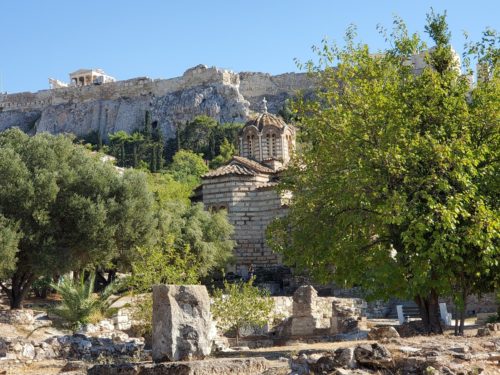
Revised October 6, 2019.
I have been probably rightfully accused of being a very serious Baby Boomer (i.e. boring, but reliable), a founding member of Mr. and Mrs. Excitement. However, I do try to add a little levity to most some of my posts, even those covering seemingly serious subjects, like Pope Francis’ visit to Philadelphia. Of course, some subjects are pretty funny all on their own, like the absurdity of some signs travelers encounter.
However, some things are just not funny. Soon after our return from a three week trip we took in July of 2005, I sat down at my computer and an essay jumped out and wrote itself. The essay was published in the Philadelphia Inquirer travel section on August 14, 2005.
During our trip, on July 7, 2005, deadly coordinated suicide bomber attacks occurred in the London subway (the Underground) system and on a city bus, killing 52 passengers and wounding many others. On July 21st, the day we flew into London’s Heathrow Airport, there were four other attempted bombings on London public transportation, but the bombs failed to explode when detonated.
A recent trip to Greece dredged up some of my feelings of despair for the human race. We visited 4 archaeology museums on Crete and in Athens, and of course, some of the most famous ruins in the world, such as the Acropolis and Agora of ancient Athens.
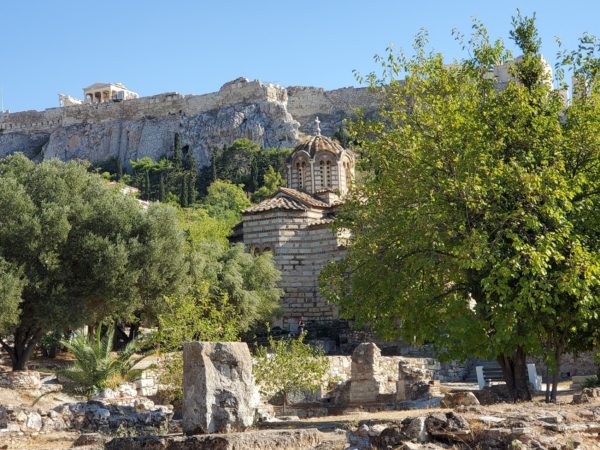
Looking up at a Greek temple on the Acropolis in Athens from the ancient Greek agora site, photobombed by a Byzantine era Christian church.
I’ve decided to go ahead and reprise this essay from 2005 (!) in hopes it will inspire Boomeresque readers to share some of the occasions during which you were confronted by evocative history in your own life or travels.
****************************************************************
Traveling Through History — August 2005
As our British Airways flight from Cyprus to London banked over the Thames River heading for Heathrow Airport, I peered out the window, half listening to the flight attendant’s familiar pre-landing litany about seat backs being in their upright position, tray tables locked, and hand luggage stowed.
The flight into London was our penultimate flight before returning to Philadelphia after a three-week trip that included visits to Barcelona, Prague, Cyprus, and a Greek island cruise. In addition to magnificent scenery, delicious ethnic cuisines, and the kindness of people we met, our itinerary provided a window into history and politics.
On the island nation of Cyprus, one day we were awakened at 5:30 a.m. by air raid sirens marking the anniversary of the 1974 Turkish invasion of Cyprus. Our hotel in Nicosia was a few blocks from the Green Line that divides the Turkish-occupied north from the Greek Cypriot south, still patrolled by armed United Nations peacekeepers.
Despite subsequent significant economic and professional success, Greek Cypriot friends forced from their homes in the Turkish-occupied north remain bitter at having been made refugees in their own country.
We saw towns with mosques next to churches, but on one side of the Green Line, the mosques were silent and on the other, the churches were still. We learned that over 32 centuries, Cyprus had also been invaded and occupied by Greeks, Assyrians, Egyptians, Persians, Romans, Byzantines, Lusignans, Venetians, Genoese, Ottomans and the British.
Each beautiful Greek island we visited shared similar turbulent histories.
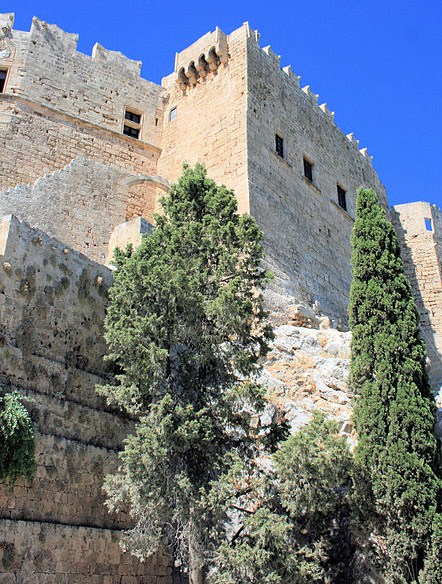
A medieval fortress built atop a Greek acropolis at Lindos on the Isle of Rhodes (Photo: Olbertz, Wikimedia Commons)
Barcelona also experienced waves of invaders and occupiers. We found this lovely city in Spain proudly preferring Catalan to the predominant Castilian Spanish language, in reaction to the not-so-long-ago fascist attempt to erase Catalunya’s culture and language.
At the center of Europe, Prague was also a sought-after prize. On one side of the famous Charles Bridge over the Vltava River, a tower still shows damage done by invading Swedes in the 17th century. As a reminder of the latest occupation, crumbling Soviet-era concrete apartment buildings ring the beautiful city center.
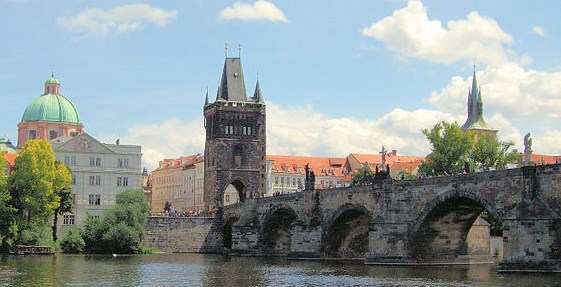
The Charles Bridge over the Vltava River in Prague, Czech Republic (Photo: Jim Linwood, Wikimedia Commons)
In every country we visited, many of the magnificent ruins were ancient fortresses atop steep hills where archaeologists had uncovered layers of construction and destruction by successive conquerors. These ruins stand as mute reminders of the avaricious, intolerant, brutal side of human nature.
As London’s iconic Tower Bridge passed beneath us, the flight attendant kept speaking, off script now, informing us that during our flight, four more explosive “devices” had been found on public transportation.
As I shuddered and wondered what this world is coming to, I realized that the saddest lesson of our journey was, “The more things change, the more they stay the same.”
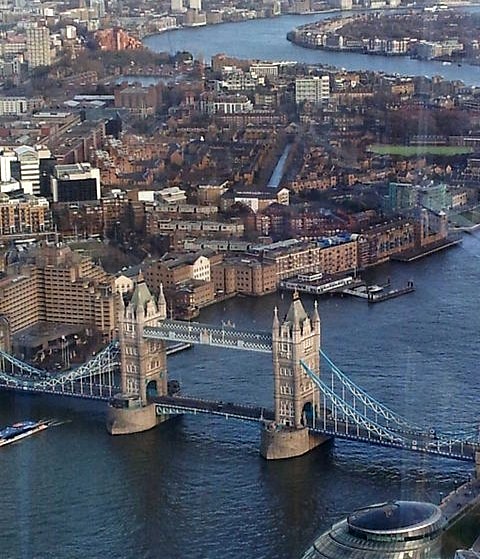



{ 24 comments… read them below or add one }
After living in Canada for several years I am still surprised when confronted by the contrast between a rich and heroic history, and the self-effacement of the Canadian people. As a psychoanalyst who tries to hover somewhere in between journalistic reportage and mental digging (archaeology), my tentative theory is that it’s hard to be tugged at on one side by Great Britain, of which Canada is and always will be a colony; and the U.S., enticing, overflowing with brand names, still wild west and Hollywood, as well as being the nation that said no to Great Britain in 1776. In general when Canadians are enjoying the U.S. they do it by surrendering to American products. When they remember their own unique, glorious history, they remember it quietly, for example by getting Tim Horton’s instead of Starbucks. When they forget both, they are derisive to Americans. I’ve been victim of this derision for 17 years, always surprised because Canada not only has a brave and beautiful history but Canadians are cool. I wish they knew it.
I recently spent a week in Canada in Toronto, Kingston and Ottawa. I found Canadians proud of their country and people and somewhat prickly about being mistaken for Americans when they travel outside of Canada. They also seem to deserve their reputation for “niceness”. However, Canada also has the Francophone – Anglophone divide, something different for Americans to get their heads around. It’s a little bit like the dichotomy between our Red states and Blue states, but in Canada the people are not only speaking past each other in terms of sensibilities, but also literally in their words.
I enjoyed this walk through history with you. Much to think about the past, lessons learned, history repeated. Being in places of historical significance can be very intense. Most recently, I was at a fortress in Italy (San Leo) where we went inside a torture chamber from the Inquisition. It’s almost too much to take in while you’re right there.
When I think of the Inquisition, I think of Spain. It would indeed be distressing to learn that there were participants in Italy as well. On the other hand, even in England, there was torture and murder over even two views of Christian doctrine — the execution of Sir Thomas More by King Henry XVIII comes to mind.
First of all, Suzanne – an extremely well written piece – no wonder they published it in The Inquirer! It is sad to think that intolerance, marauding, destroying, etc. is part of human nature and therefore will always rear it’s head somewhere, sometime, somehow, like a whak-a-mole! Yet the “impulse” to help and do good also seems to be an irrepressible part of human nature. Thank goodness! Maybe when Hillary is President – we’ll get more women involved in all levels of government and some other options will be explored. (I’m not saying that Hillary won’t be tough – she will.) Your piece brought to mind how profoundly rattled (probably not a strong enough term) we were by 9-11. How feeling “terror”fied, uncertain, vulnerable, etc. became status quo for quite awhile. It seems we have recalibrated/internalized a certain amount of “that’s just the way it is now” and have gone on with our lives, perhaps with a slightly more “fatalistic” tinge to our “doings.” But “do” we do! Apparently, it’s human nature, to get on with it, too – no matter what!!
Madaline I am happy to see you support Hillary for President. I do too! And mentioning it when responding to a blog post is a s good a way to start the ball rolling as any. I call upon other Hillary 4 Prez supporters to consider creatively responding to their favorite blogs in this way.
Roz–Google’s Penguin doesn’t like for comments to stray from the subject matter of the post, so Hillary should probably find other ways of “getting the ball rolling”—so to speak.
I have done alot of traveling in my life and I enjoy seeing other countries and learning and meeting people. I constantly have heard over the years that French are nasty to Americans. I have traveled all of France and I have never had one encounter with anyone overseas being nasty. We are all people and if you have a smile on your face and are kind to others I see it in return. We all have a different way of life.
When we have visited towns throughout Europe that were destroyed during the wars, it saddens me as a piece of that country’s history gone. I couldn’t believe on our trip to Malta, Malta what we see in Malta. Malta wasn’t at all prepared for the Second World War. She had no aircraft. During the Second World War, Malta was the most bombed place on earth. A bomb fell right down through the roof of Mosta church. This was one of the biggest churches and there were over 250 people attending a service at that time. and no one was killed and this was considered as a miracle. When we were there the bomb was still in the floor where it landed. I understand it has been removed and now there is a replica.
Traveling is a humbling experience.
In the United States, we tend not to know as much about other countries’ history and culture as they know about ours. Indeed, English has become the lingua franca of Europe because of the omnipresence of American TV, films and pop culture. Especially in countries where there’s not enough of an audience to justify the expense of dubbing, movies and TV shows have sub-titles and people are practically bi-lingual by the time they finish school. Try finding someone under the age of 40 who doesn’t speak decent English in the Netherlands and Scandinavia.
When we were in Cyprus in 2005, we learned a lot about the conflict between the Turkish and Greek populations and we learned that there were still UN troops patrolling the border between the Greek and Turkish sectors. Consequently, it was quite chilling to be awoken by air raid sirens (the kind you hear in programs about the London Blitz) since we didn’t know they were to commemorate the day Turkish troops “invaded” (or liberated) the north of Cyprus — depending on your point of view. And in Flanders, they are still collecting unexploded shells from farmers’ fields — from the First World War!!
I remember that day well, I was at home with a baby, my husband was working in Central London. Those were scary times. I’m in Lao right now, the most bombed country in the world, shell cases and bombs are everywhere, used as garden ornaments and recycled into flowerpots and all kinds of objects. One person a day still dies from UXO. We’ve heard explosions in the distance twice, sad but true. That sort of history makes you see a country through different eyes, I have incredible respect for the Lao people.
Alyson, there is an example of the benefit of being somewhere to get a better understanding of the ongoing consequences of history. We are hoping to have an opportunity to visit Laos next spring and your blog will be a “go to” resource.
What an interesting piece. I’m glad you dusted it off for the blog! I am always appalled how history repeats itself in so many instances and wonder why as a human race we don’t learn from past lessons. I also flew into London on the same day that the bomb went off in the underground.
Johanna, the common denominator in history repeating itself is human beings. Apparently, our species has the capacity to produce both Adoph Hitlers and Mother Teresas. We harnessed the better angels of our nature to eradicate small pox in the world, but our darker side has produced weapons of mass destruction. I do believe that knowledge is a disinfectant which is why some powerful forces bent on evil are so keen to keep the masses from having the tools for critical thinking.
That was fantastic post, Suzanne and I read your question at the end. I pondered for a few minutes and I thought first about you mentioning your flight banking over the Thames River. And then you took us through your journey and shared about a world changing. I have studied WWII history (my father was a history teacher for 30 years) most of my adult life. I am far from any expert on it. But, in 1995 I got to take a week’s
vacation to Oahu with my then wife. And the #1 item on the agenda was to fulfill my lifelong dream of visiting Pearl Harbor and taking in every tour they had including Pearl Harbor. I had seen the old Tora, Tora, Tora a gazillion times and all of the archived footage from that dreadful Sunday morning. Yet, it wasn’t until I was able to stand there looking out over the harbor with my own eyes that it really hit me. Then, of course, the Arizona Memorial. We were so blessed with being able to talk to some Japanese-Americans who were there on a tribute trip to honor the war’s victims that I learned so much more about how they were affected during the war that I said to myself, “Wow, you don’t get to read stuff like that in the textbooks.” I’m speaking
of not all of the people of Japan supported the war. Many were forced into a position they did not want to be in for fear of their life. My mother’s third husband (she liked to practice a lot at marriage 🙂 ) was a Japanese-American who was interned during the war but he would share virtually nothing about it. And all those thoughts went flying through my mind and emotions as I again looked out over the harbor and pictured that morning 50 years ago (at that time).
Mike, thank you so much for sharing your experience at Pearl Harbor. The first time I visited there, I was surprised to see that fully half of the tourists sitting around me watching the introductory film were Japanese. But it made sense. It was a place where there was an awful intersection of our histories. When I visited Japan, I admit that I shielded myself from visiting Hiroshima. I’ve read extensively about the effects of the bomb and I just could not bear to see it up close. These are the events of history writ large, but most people, most of the time are just trying to live meaningful lives, caring for their loved ones. It is very sad to say, but probably it will take an invasion by space aliens for the entire human race to put aside our differences and band together.
Learning about the history of a place and its people has enhanced my travel experiences everywhere, every time. “Enhanced,” that is, in the sense of “more meaningful” but certainly not necessarily “more pleasant.” Life-changing examples that leap to mind: being imprinted with the horrendous history of the Dachau by visiting it when I was 16, right after it opened to visitors; during the same trip, learning about the post-war history of Berlin while visiting it, and then hearing gunfire at night (every night), not long after the Wall was erected; and spending three winters in Moscow during the Cold War after majoring in Soviet Studies in college.
Leslie, you are exactly right. Learning the history enhances the experience of visiting somewhere, but sometimes it is even beyond “not pleasant” — all the way to deeply disturbing. A few that spring to mind are Kilmainham Gaol in Dublin, Normandy (France) and Flanders (Belgium). I’d love to hear more about your experiences during 3 winters in Moscow during the Cold War. Guest post??
Deeply disturbing indeed.
Thank you for the invitation to write a guest post. Maybe at a later time. Right now, I write for a living (legal writing) and have not yet had the wherewithal to to do what it would take to render my memories of those experiences publishable in any public forum.
In many respects remembering our brutality is a good reminder to do better and be better humans. Although so many moments in history are sad and destructive, when I look at most of the pictures above I see more majesty and beauty than violence. In a different frame of mind you could travel to all of those places and see things of beauty and grace and I’ve no doubt that you did. It’s important to remember both sides of our nature.
It is the duality of our nature that makes us (and history, and art and culture) so interesting and compelling, but also so disappointing at times.
Amazing journey through history, indeed! I remember how beautiful Prague was and how I loved the historical part of this city. I miss this place a lot and I wish I could come back there any time soon.
The biggest lesson I’ve learned from my travels is that being “top dog” or a “super power” or what ever you want to call it is essentially pretty meaningless in the long (long) run. It seems like everywhere you had their moment when they were the most (or one of the most) important place on the planet.
Absolutely. International travel teaches one that it would make sense for “Super Powers” to play nice because they may not always be the biggest kid in the sandbox. For examples, ask Greece, Italy, Spain, and the United Kingdom.
I wish your article could be reprised with better news. We never seem to learn from history. I hope the rest of your travels this trip are filled with uneventful and pleasant days.
{ 2 trackbacks }